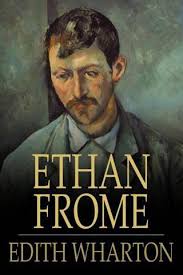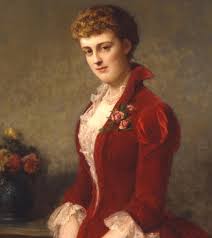Ethan Frome Page #20
Ethan Frome is a 1911 book by American author Edith Wharton. It is set in the fictitious town of Starkfield, Massachusetts. The novel was adapted into a film, Ethan Frome, in 1993.
“If I'd 'a' listened to folks, you'd 'a' gone before now, and this wouldn't 'a' happened,” she said; and gathering up the bits of broken glass she went out of the room as if she carried a dead body... VIII When Ethan was called back to the farm by his father's illness his mother gave him, for his own use, a small room behind the untenanted “best parlour.” Here he had nailed up shelves for his books, built himself a box-sofa out of boards and a mattress, laid out his papers on a kitchen-table, hung on the rough plaster wall an engraving of Abraham Lincoln and a calendar with “Thoughts from the Poets,” and tried, with these meagre properties, to produce some likeness to the study of a “minister” who had been kind to him and lent him books when he was at Worcester. He still took refuge there in summer, but when Mattie came to live at the farm he had to give her his stove, and consequently the room was uninhabitable for several months of the year. To this retreat he descended as soon as the house was quiet, and Zeena's steady breathing from the bed had assured him that there was to be no sequel to the scene in the kitchen. After Zeena's departure he and Mattie had stood speechless, neither seeking to approach the other. Then the girl had returned to her task of clearing up the kitchen for the night and he had taken his lantern and gone on his usual round outside the house. The kitchen was empty when he came back to it; but his tobacco-pouch and pipe had been laid on the table, and under them was a scrap of paper torn from the back of a seedsman's catalogue, on which three words were written: “Don't trouble, Ethan.” Going into his cold dark “study” he placed the lantern on the table and, stooping to its light, read the message again and again. It was the first time that Mattie had ever written to him, and the possession of the paper gave him a strange new sense of her nearness; yet it deepened his anguish by reminding him that henceforth they would have no other way of communicating with each other. For the life of her smile, the warmth of her voice, only cold paper and dead words! Confused motions of rebellion stormed in him. He was too young, too strong, too full of the sap of living, to submit so easily to the destruction of his hopes. Must he wear out all his years at the side of a bitter querulous woman? Other possibilities had been in him, possibilities sacrificed, one by one, to Zeena's narrow-mindedness and ignorance. And what good had come of it? She was a hundred times bitterer and more discontented than when he had married her: the one pleasure left her was to inflict pain on him. All the healthy instincts of self-defence rose up in him against such waste... He bundled himself into his old coon-skin coat and lay down on the box-sofa to think. Under his cheek he felt a hard object with strange protuberances. It was a cushion which Zeena had made for him when they were engaged--the only piece of needlework he had ever seen her do. He flung it across the floor and propped his head against the wall... He knew a case of a man over the mountain--a young fellow of about his own age--who had escaped from just such a life of misery by going West with the girl he cared for. His wife had divorced him, and he had married the girl and prospered. Ethan had seen the couple the summer before at Shadd's Falls, where they had come to visit relatives. They had a little girl with fair curls, who wore a gold locket and was dressed like a princess. The deserted wife had not done badly either. Her husband had given her the farm and she had managed to sell it, and with that and the alimony she had started a lunch-room at Bettsbridge and bloomed into activity and importance. Ethan was fired by the thought. Why should he not leave with Mattie the next day, instead of letting her go alone? He would hide his valise under the seat of the sleigh, and Zeena would suspect nothing till she went upstairs for her afternoon nap and found a letter on the bed... His impulses were still near the surface, and he sprang up, re-lit the lantern, and sat down at the table. He rummaged in the drawer for a sheet of paper, found one, and began to write. “Zeena, I've done all I could for you, and I don't see as it's been any use. I don't blame you, nor I don't blame myself. Maybe both of us will do better separate. I'm going to try my luck West, and you can sell the farm and mill, and keep the money--” His pen paused on the word, which brought home to him the relentless conditions of his lot. If he gave the farm and mill to Zeena what would be left him to start his own life with? Once in the West he was sure of picking up work--he would not have feared to try his chance alone. But with Mattie depending on him the case was different. And what of Zeena's fate? Farm and mill were mortgaged to the limit of their value, and even if she found a purchaser--in itself an unlikely chance--it was doubtful if she could clear a thousand dollars on the sale. Meanwhile, how could she keep the farm going? It was only by incessant labour and personal supervision that Ethan drew a meagre living from his land, and his wife, even if she were in better health than she imagined, could never carry such a burden alone. Well, she could go back to her people, then, and see what they would do for her. It was the fate she was forcing on Mattie--why not let her try it herself? By the time she had discovered his whereabouts, and brought suit for divorce, he would probably--wherever he was--be earning enough to pay her a sufficient alimony. And the alternative was to let Mattie go forth alone, with far less hope of ultimate provision... He had scattered the contents of the table-drawer in his search for a sheet of paper, and as he took up his pen his eye fell on an old copy of the Bettsbridge Eagle. The advertising sheet was folded uppermost, and he read the seductive words: “Trips to the West: Reduced Rates.” He drew the lantern nearer and eagerly scanned the fares; then the paper fell from his hand and he pushed aside his unfinished letter. A moment ago he had wondered what he and Mattie were to live on when they reached the West; now he saw that he had not even the money to take her there. Borrowing was out of the question: six months before he had given his only security to raise funds for necessary repairs to the mill, and he knew that without security no one at Starkfield would lend him ten dollars. The inexorable facts closed in on him like prison-warders handcuffing a convict. There was no way out--none. He was a prisoner for life, and now his one ray of light was to be extinguished. He crept back heavily to the sofa, stretching himself out with limbs so leaden that he felt as if they would never move again. Tears rose in his throat and slowly burned their way to his lids. As he lay there, the window-pane that faced him, growing gradually lighter, inlaid upon the darkness a square of moon-suffused sky. A crooked tree-branch crossed it, a branch of the apple-tree under which, on summer evenings, he had sometimes found Mattie sitting when he came up from the mill. Slowly the rim of the rainy vapours caught fire and burnt away, and a pure moon swung into the blue. Ethan, rising on his elbow, watched the landscape whiten and shape itself under the sculpture of the moon. This was the night on which he was to have taken Mattie coasting, and there hung the lamp to light them! He looked out at the slopes bathed in lustre, the silver-edged darkness of the woods, the spectral purple of the hills against the sky, and it seemed as though all the beauty of the night had been poured out to mock his wretchedness...
Translation
Translate and read this book in other languages:
Select another language:
- - Select -
- 简体中文 (Chinese - Simplified)
- 繁體中文 (Chinese - Traditional)
- Español (Spanish)
- Esperanto (Esperanto)
- 日本語 (Japanese)
- Português (Portuguese)
- Deutsch (German)
- العربية (Arabic)
- Français (French)
- Русский (Russian)
- ಕನ್ನಡ (Kannada)
- 한국어 (Korean)
- עברית (Hebrew)
- Gaeilge (Irish)
- Українська (Ukrainian)
- اردو (Urdu)
- Magyar (Hungarian)
- मानक हिन्दी (Hindi)
- Indonesia (Indonesian)
- Italiano (Italian)
- தமிழ் (Tamil)
- Türkçe (Turkish)
- తెలుగు (Telugu)
- ภาษาไทย (Thai)
- Tiếng Việt (Vietnamese)
- Čeština (Czech)
- Polski (Polish)
- Bahasa Indonesia (Indonesian)
- Românește (Romanian)
- Nederlands (Dutch)
- Ελληνικά (Greek)
- Latinum (Latin)
- Svenska (Swedish)
- Dansk (Danish)
- Suomi (Finnish)
- فارسی (Persian)
- ייִדיש (Yiddish)
- հայերեն (Armenian)
- Norsk (Norwegian)
- English (English)
Citation
Use the citation below to add this book to your bibliography:
Style:MLAChicagoAPA
"Ethan Frome Books." Literature.com. STANDS4 LLC, 2025. Web. 25 Feb. 2025. <https://www.literature.com/book/ethan_frome_264>.








Discuss this Ethan Frome book with the community:
Report Comment
We're doing our best to make sure our content is useful, accurate and safe.
If by any chance you spot an inappropriate comment while navigating through our website please use this form to let us know, and we'll take care of it shortly.
Attachment
You need to be logged in to favorite.
Log In